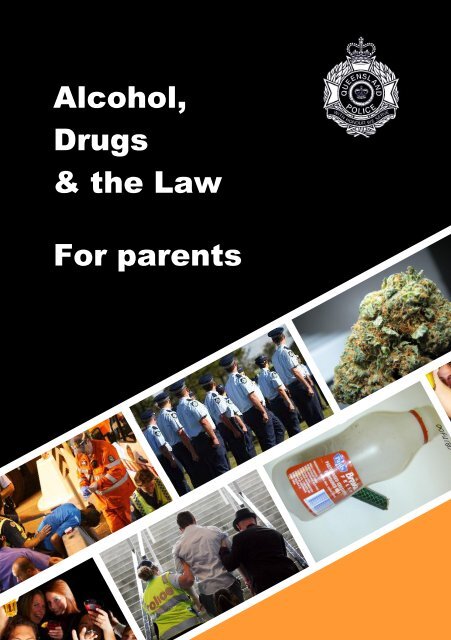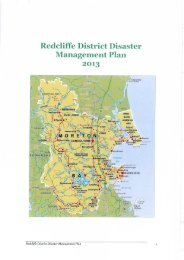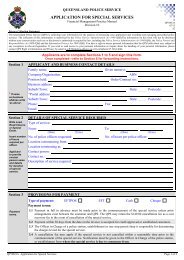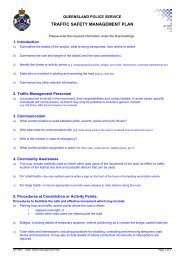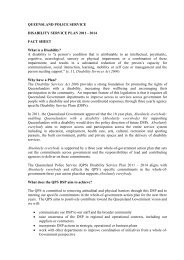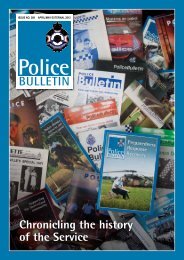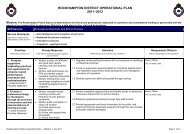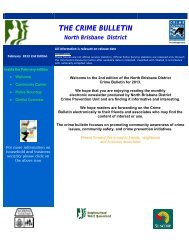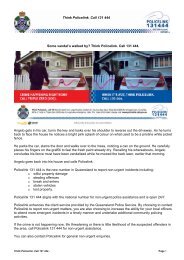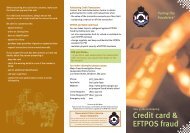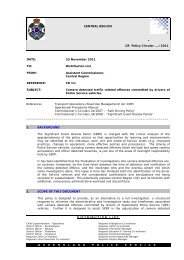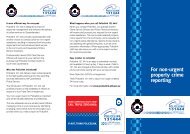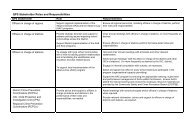Alcohol, Drugs & the Law: For Parents - Queensland Police Service
Alcohol, Drugs & the Law: For Parents - Queensland Police Service
Alcohol, Drugs & the Law: For Parents - Queensland Police Service
You also want an ePaper? Increase the reach of your titles
YUMPU automatically turns print PDFs into web optimized ePapers that Google loves.
<strong>Alcohol</strong>,<br />
<strong>Drugs</strong><br />
& <strong>the</strong> <strong>Law</strong><br />
<strong>For</strong> parents
Patterns of alcohol and o<strong>the</strong>r drug use by young Australians<br />
<strong>Alcohol</strong> and o<strong>the</strong>r drug use by young Australians:<br />
<br />
<br />
<br />
<br />
<br />
Eight out of every ten Australian secondary students aged between<br />
12 and 17 years of age have tried alcohol at some time in <strong>the</strong>ir lives,<br />
with fewer than 20% of all 17 year old students reporting that <strong>the</strong>y<br />
have consumed alcohol at risky levels in <strong>the</strong> past week. Most high<br />
school students will obtain <strong>the</strong>ir alcohol from <strong>the</strong>ir parents or friends<br />
and are most likely to drink alcohol in <strong>the</strong> home or at a party.<br />
The proportion of secondary school students reporting to have<br />
smoked tobacco in <strong>the</strong> past year increases from 5% of 12 year olds<br />
to 31% of 17 year olds.<br />
Cannabis is <strong>the</strong> most commonly used illicit substance among<br />
secondary school students. Over one in four 17 year olds reported<br />
having used cannabis, most commonly whilst at a friend’s place or a<br />
party.<br />
By <strong>the</strong> age of 17, almost one in four Australian secondary students<br />
will have used inhalants, one in ten will have used ecstasy, 5.2% will<br />
have used hallucinogens and 3.7% will have used amphetamines.<br />
In total almost one in four 14-17 year olds reported having used an<br />
illicit drug.<br />
3.2% of 14-17 year olds reported <strong>the</strong> use of pharmaceuticals for<br />
non-medical purposes. The pharmaceuticals most likely to have<br />
been used were analgesics (pain killers) followed by tranquillisers<br />
(sleeping pills).<br />
Source: Australian Government Department of Health and Ageing (2009)<br />
‘Australian secondary school students’ use of tobacco, alcohol, and over<strong>the</strong>-counter<br />
and illicit substances in 2008’ and Australian Institute of<br />
Health and Welfare (2011) ‘2010 National drug strategy household<br />
survey report.’
The harms associated with alcohol and o<strong>the</strong>r drug use<br />
The harms associated with alcohol and o<strong>the</strong>r drug use vary according to<br />
many factors (e.g. <strong>the</strong> physical and mental health of <strong>the</strong> individual user,<br />
<strong>the</strong> drug being used and <strong>the</strong> setting in which <strong>the</strong> drug use is taking place),<br />
but can include:<br />
<br />
<br />
<br />
<br />
<br />
<br />
<br />
Inappropriate sexual or violent behaviour, drowning, or being injured<br />
(e.g. in a motor vehicle accident).<br />
Medical complications (e.g. damage to <strong>the</strong> liver, brain, lungs), coma<br />
or death.<br />
Unsafe use or experimentation with o<strong>the</strong>r drugs. <strong>Alcohol</strong> and o<strong>the</strong>r<br />
drugs can interact with each o<strong>the</strong>r, which can amplify <strong>the</strong> effects of<br />
<strong>the</strong> drugs, increase <strong>the</strong> risk of overdose or result in adverse and<br />
unpredictable reactions between <strong>the</strong> substances being used.<br />
Problems with social, school, or family relationships (e.g. conflict<br />
with parents, becoming involved with peer groups that foster heavy<br />
drinking and o<strong>the</strong>r drug use).<br />
A drop in school performance including attendance, grades, test<br />
scores and <strong>the</strong> ability to pay attention in class.<br />
Psychiatric problems, including alcohol/drug dependence, psychosis,<br />
anxiety, depression, and schizophrenia, particularly in people with a<br />
family history of mental illness.<br />
Drug use may also bring young people into contact with <strong>the</strong> police<br />
and <strong>the</strong> courts. This contact can have significant social and<br />
personal consequences.<br />
If your child is using drugs <strong>the</strong>y are at risk of harm. Even if <strong>the</strong>y<br />
have never used drugs, <strong>the</strong>re is a good chance that <strong>the</strong>y will<br />
encounter situations where <strong>the</strong>re are pressures to try different<br />
drugs, or at <strong>the</strong> very least be around o<strong>the</strong>rs who are experimenting.<br />
Source: Australian Drug Foundation (2011) ‘DrugInfo: drug facts’ and<br />
Australian Government Department of Health and Ageing (2011)<br />
‘National drugs campaign’
Legal aspects of alcohol and o<strong>the</strong>r drug use by young people<br />
Generally, young people under 18 years of age are committing an<br />
offence if <strong>the</strong>y:<br />
<br />
<br />
<br />
<br />
<br />
<br />
<br />
<br />
<br />
<br />
<br />
<br />
<br />
<br />
<br />
are found on licensed premises<br />
consume, or are in possession of, alcohol in licensed premises or a<br />
public place. It is even an offence for a minor to hold a drink for a<br />
friend or help someone carry <strong>the</strong>ir alcohol in licensed premises or a<br />
public place.<br />
give alcohol to ano<strong>the</strong>r minor, who is under 18 years of age, in a<br />
licensed premise or public place.<br />
send someone else who is a minor to buy alcohol.<br />
use someone else’s ID to try to purchase alcohol or to gain entry to<br />
licensed premises.<br />
alter an ID (including changing <strong>the</strong> date of birth) or make a false ID.<br />
are being a public nuisance.<br />
possess, produce or supply illegal drugs (this includes growing<br />
cannabis).<br />
publish or possess a recipe for <strong>the</strong> production of a dangerous drug.<br />
drive or are in charge of a motor vehicle (e.g. car, motorbike) with an<br />
alcohol concentration of over 0.00 (no alcohol limit) if <strong>the</strong>y are on L<br />
plates, a provisional licence or a probationary licence.<br />
drive or are in charge of a motor vehicle, on an open licence, with an<br />
alcohol concentration of 0.05 or above (general alcohol limit).<br />
drive a vehicle whilst being unlicensed.<br />
drive or are in charge of a motor vehicle under <strong>the</strong> influence of<br />
illegal drugs.<br />
sell or supply tobacco to a minor under 18 years of age.<br />
give someone prescription drugs, o<strong>the</strong>r than as prescribed.<br />
What is a minor?<br />
Under <strong>the</strong> law, you are a minor if you are under 18 years of age.<br />
However, in <strong>Queensland</strong>, at 17 years of age you are an adult within <strong>the</strong><br />
criminal justice system and will be dealt with in <strong>the</strong> adult court.
Generally, it is not an offence:<br />
<br />
<br />
for a young person to be at a party where illegal drugs are present,<br />
provided <strong>the</strong>y have not consumed or been in possession of any<br />
illegal drugs. They may be questioned by police if found at a party<br />
where <strong>the</strong>re are illegal drugs, and <strong>the</strong>y may still be at risk of harm,<br />
even if <strong>the</strong>y have not consumed drugs.<br />
for a young person to inhale volatile substances, however, this<br />
misuse can cause significant and long-term health problems. If <strong>the</strong><br />
police know, or reasonably suspect, that a volatile substance is<br />
being, or is about to be inhaled, <strong>the</strong>y have <strong>the</strong> power to search,<br />
seize and dispose of <strong>the</strong> volatile substance. Anyone affected by<br />
consuming or inhaling a potentially harmful substance may also be<br />
taken home or to ano<strong>the</strong>r place of safety by police.<br />
Are parents and guardians legally responsible?<br />
It is an offence for anybody to:<br />
<br />
<br />
<br />
<br />
supply alcohol to a minor in a licensed premise or public place.<br />
send a minor to buy alcohol.<br />
allow <strong>the</strong>ir home, or o<strong>the</strong>r place under <strong>the</strong>ir control, to be used for<br />
possessing, supplying or producing illegal drugs.<br />
Supply alcohol to a minor in a private place if <strong>the</strong>y are not a<br />
‘responsible adult’ for <strong>the</strong> minor.<br />
Who is a responsible adult for a minor?<br />
A responsible adult for a minor is a parent, step-parent or guardian of a<br />
minor or an adult who has parental rights and responsibilities for <strong>the</strong><br />
minor.<br />
Generally, it is not an offence for you to supply alcohol to a minor within<br />
your property, or someone else’s private property, providing you are a<br />
‘reasonable adult’ for <strong>the</strong> minor. However, it is an offence if you are not<br />
responsibly supervising <strong>the</strong> minor’s consumption of <strong>the</strong> alcohol. Factors<br />
that police will consider include whe<strong>the</strong>r you or <strong>the</strong> minor are unduly<br />
intoxicated, <strong>the</strong> age of <strong>the</strong> minor, <strong>the</strong> quantity of alcohol being supplied<br />
and if food is provided.
What happens if a young person commits an illegal drug related offence<br />
and is caught by police?<br />
Their parents/guardians may be notified. If <strong>the</strong> arrest occurs away from<br />
home, <strong>the</strong> young person may be brought home or taken to ano<strong>the</strong>r place<br />
of safety. If arrested, <strong>the</strong> young person may be taken by police for<br />
questioning. <strong>Parents</strong> or ano<strong>the</strong>r support person would normally be<br />
requested to attend such an interview, if <strong>the</strong> person is less than 17 years<br />
of age at <strong>the</strong> time. The young person may be fingerprinted and<br />
photographed, and under certain circumstances, a young person may be<br />
searched by police. Some searches of persons under 17 years of age<br />
may require <strong>the</strong> presence of a parent or ano<strong>the</strong>r support person.<br />
A young person may be cautioned, diverted, or charged. If <strong>the</strong>y commit<br />
an offence <strong>the</strong> police may:<br />
<br />
<br />
<br />
caution <strong>the</strong> young person. This involves a formal warning by <strong>the</strong><br />
police, in which a notice of caution may be issued.<br />
offer a referral to a drug diversion assessment program (for minor<br />
cannabis related offences). This program normally consists of a 2-<br />
hour session with a health worker who will assess <strong>the</strong> young<br />
person’s drug use and provide <strong>the</strong>m with education and counselling.<br />
charge <strong>the</strong> young person. In this event, <strong>the</strong> young person would<br />
normally be required to attend a court hearing. This may involve<br />
bail. If convicted, sentences depend on <strong>the</strong> type of drug, type of<br />
activity (possession, sale, or production) and <strong>the</strong> quantity found.<br />
What are <strong>the</strong> long term consequences of a conviction?<br />
In <strong>Queensland</strong>, laws governing most forms of drug use, and <strong>the</strong> penalties<br />
for misusing drugs, can be harsh. Convictions are recorded for some<br />
offences and can have a negative impact on a young person’s future. A<br />
conviction for a drug offence may affect <strong>the</strong> type of job that a young<br />
person can aspire to, holding certain licenses as an adult, or <strong>the</strong>ir<br />
chances of getting a visa for entry into some countries. Even where<br />
convictions are not recorded, <strong>the</strong> offence may still have an impact on<br />
what a young person can and cannot do e.g. obtaining a Blue Card to<br />
work with children involves checking both recorded and unrecorded<br />
convictions.
How to reduce <strong>the</strong> risk of your child experiencing alcohol and o<strong>the</strong>r drug<br />
related harms<br />
Be aware!<br />
<br />
<br />
<br />
<br />
<br />
Parties are one of <strong>the</strong> most common settings in which young<br />
people will encounter alcohol and o<strong>the</strong>r drugs.<br />
If young people are on your property, you may be liable for <strong>the</strong>ir<br />
safety. If a young person suffers trauma or injury under your care,<br />
you could face liability through civil proceedings against you.<br />
Boys and girls differ in <strong>the</strong> risks <strong>the</strong>y are exposed to when at<br />
venues where alcohol and o<strong>the</strong>r drugs are being consumed.<br />
Young women may be at greater risk of unwanted sexual<br />
attention, coercion, or sexual assault. Young men are at greater<br />
risk of damaging property or personal violence.<br />
Drink ‘spiking’ is a criminal act that can occur in a range of<br />
settings including hotels, nightclubs and private parties.<br />
Young people under <strong>the</strong> age of 16 cannot legally consent to<br />
sexual relations. <strong>Alcohol</strong> and o<strong>the</strong>r drug use can erode a young<br />
person’s judgment in making decisions on this issue.<br />
Drink ‘Spiking is when alcohol or ano<strong>the</strong>r drug has been added to<br />
someone’s drink without <strong>the</strong>ir knowledge.<br />
Prevent problems by effectively communicating with you child<br />
about alcohol and o<strong>the</strong>r drugs.<br />
<br />
<br />
<br />
In preparation for talking with your child, make sure that you and<br />
your partner agree on <strong>the</strong> rules and expectations about alcohol and<br />
o<strong>the</strong>r drugs so that your messages are consistent. Choose <strong>the</strong> right<br />
time to do this – <strong>the</strong> hour before <strong>the</strong>y are going out may not be <strong>the</strong><br />
best time.<br />
Set clear rules and expectations with your child about what sort of<br />
behaviour is acceptable and what is not.<br />
Occasionally revisit <strong>the</strong> above agreements with your child, and<br />
monitor <strong>the</strong>ir experiences of when <strong>the</strong>se rules and expectations<br />
might have been tested.
Reach agreement on <strong>the</strong> time that <strong>the</strong>y are to arrive home.<br />
Communicate <strong>the</strong> importance of sticking closely to that time.<br />
Reach agreement on <strong>the</strong> way your child is to get home, and who<br />
might accompany <strong>the</strong>m home. Discourage <strong>the</strong>m from walking home<br />
alone.<br />
Older siblings are important role models for young people. Take <strong>the</strong><br />
time to talk through with <strong>the</strong> older sibling about your concerns and<br />
expectations, and reach agreement on expectations.<br />
Remind your child that <strong>the</strong>y don’t need to drink to have fun. It’s ok<br />
to say ‘no’ to friends if <strong>the</strong>y offer <strong>the</strong>m alcohol and o<strong>the</strong>r drugs.<br />
Agree with your child on ‘back-up’ plans for risky situations.<br />
<br />
<br />
<br />
<br />
Discuss what <strong>the</strong>y should do if <strong>the</strong>re are unexpected delays or<br />
problems with getting home, including how <strong>the</strong>y might contact you to<br />
let you know of <strong>the</strong> delay or problem.<br />
Agree on an early detection and escape plan for dangerous<br />
situations. Make sure this plan is clear in your child’s mind. Sexual<br />
coercion and assault is an especially significant risk for young<br />
women.<br />
Let <strong>the</strong>m know that you are prepared to go and pick <strong>the</strong>m up. While<br />
this can be inconvenient, it can reduce <strong>the</strong> risk of assault and o<strong>the</strong>r<br />
problems.<br />
Keep communication lines open so that if your child is <strong>the</strong> victim of a<br />
criminal offence, he or she feels safe to disclose such an event to<br />
you or ano<strong>the</strong>r authority figure (e.g. school guidance officer,<br />
telephone counsellor or <strong>the</strong> police).<br />
Know your child’s friends.<br />
<br />
<br />
Be aware of who your child’s friends are. If you suspect that <strong>the</strong>y<br />
are using drugs, communicate to your child that your interest is in<br />
protecting <strong>the</strong>ir health and well-being, and explore ways of reducing<br />
any pressures to misuse alcohol and o<strong>the</strong>r drugs.<br />
Encourage a strong sense of responsibility in your child to look after<br />
friends who are at risk of alcohol or o<strong>the</strong>r drug-related harm. <strong>For</strong><br />
example, your child could facilitate an early and safe exit for a friend<br />
who is intoxicated.
Web resources:<br />
Party Safe<br />
http://www.police.qld.gov.au/party<br />
<strong>For</strong> information on holding safe and lawful parties<br />
Australian Drug Foundation<br />
http://druginfo.adf.org.au/<br />
<strong>For</strong> information about alcohol and o<strong>the</strong>r drugs and <strong>the</strong> prevention of<br />
related harms<br />
Australian Drug Information Network (ADIN)<br />
http://www.adin.com.au<br />
<strong>For</strong> access to information about alcohol and o<strong>the</strong>r drugs by prominent<br />
organisations in Australia and internationally<br />
<strong>Alcohol</strong>, Tobacco and O<strong>the</strong>r <strong>Drugs</strong> (ATOD)<br />
www.health.qld.gov.au/atod/drug_info/default.asp<br />
<strong>Queensland</strong> Health information and resources on <strong>the</strong> effects and impact<br />
of alcohol and o<strong>the</strong>r drug use<br />
Department of Health and Ageing<br />
www.alcohol.gov.au<br />
<strong>For</strong> <strong>the</strong> Australian <strong>Alcohol</strong> Guidelines and information about alcoholrelated<br />
health issues and Australian Government policy
CONTACTS<br />
Emergency<br />
Call Triple Zero (000) if your life is in danger,<br />
<strong>the</strong>re is a serious risk to your property, or a<br />
crime is happening now.<br />
Non-urgent incidents:<br />
Call <strong>Police</strong>link 131 444 for non-urgent police<br />
assistance 24 hours a day 7 days a week.<br />
Alternatively visit or call your local police<br />
station.<br />
Crime Stoppers<br />
Call Crime Stoppers on 1800 333 000 to provide<br />
confidential information anonymously about<br />
unsolved crime.<br />
Support <strong>Service</strong>s<br />
Call <strong>Alcohol</strong> Drug Information <strong>Service</strong> (ADIS)<br />
any time of <strong>the</strong> day or week on 1800 177 833 for<br />
support, information, advice, crisis counselling<br />
and referral services.<br />
<br />
Our Vision is to help make <strong>Queensland</strong> a safe and secure place to live, visit and do<br />
business. Our Purpose is to deliver quality policing services 24 hours a day.<br />
© The State of <strong>Queensland</strong> (<strong>Queensland</strong> <strong>Police</strong> <strong>Service</strong>) 2012<br />
http:/creativecommons.org/licenses/by/3.0/au/deed.en Drug and <strong>Alcohol</strong><br />
Coordination Unit, Operations Support Command


